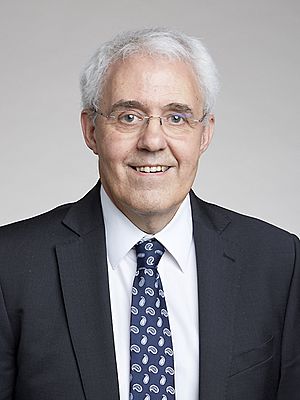Tony Bell (physicist) facts for kids
Quick facts for kids
Tony Bell
|
|
|---|---|

Bell in 2017
|
|
| Born | 9 June 1952 Lincoln, England
|
| Education | Leeds Modern School |
| Alma mater | Churchill College, Cambridge |
| Spouse(s) |
Irene Barnett
(m. 1975) |
| Children | 3 |
| Awards |
|
| Scientific career | |
| Fields | Physics |
| Institutions |
|
| Thesis | Young supernova remnants (1977) |
Anthony Raymond Bell is a British physicist born on June 9, 1952. He is a professor of physics at the University of Oxford and the Rutherford Appleton Laboratory. He is also a senior research fellow at Somerville College, Oxford.
Contents
Early Life and Education
Anthony Raymond Bell was born in Lincoln, England. He went to Leeds Modern School and then to Churchill College, Cambridge. There, he studied natural sciences. In 1977, he earned his PhD in radio astronomy. His research focused on supernova remnants, which are the remains of huge stars that have exploded.
Career and Research
After getting his PhD, Dr. Bell worked on how radar signals are processed for Marconi Electronic Systems. Later, he moved to the Central Laser Facility. There, he became a scientist who studies how lasers interact with plasma. Plasma is often called the fourth state of matter, like a super-hot gas where atoms are broken apart into tiny charged particles.
In 1985, he became a lecturer at Imperial College London and later a professor in 1998. After working with the Methodist Church for two years, he joined both the Clarendon Laboratory and the Central Laser Facility in 2007.
What Dr. Bell Studies
Dr. Bell's main research is in plasma physics. He helped develop a key idea about how cosmic rays get their incredible energy. Cosmic rays are very fast, tiny particles that travel through space. He showed how strong magnetic fields are created when these particles speed up. These magnetic fields help cosmic rays reach very high energies.
He also started a theory about how heat moves in inertial confinement fusion. This is a way scientists hope to create clean energy by using lasers to heat tiny fuel pellets. Dr. Bell also explained how powerful lasers can focus energetic electrons using magnetic fields. With another scientist, John G. Kirk, he showed that electron-positron pair production could happen when super-intense lasers interact with plasma. This means creating pairs of electrons and their antimatter partners, positrons.
Awards and Honours
Dr. Bell has received many important awards for his work:
- In 2014, he was given the Fred Hoyle Medal and Prize. This was for his work on where cosmic rays come from and how they affect things. It was also for his important contributions to how electrons move energy in laboratory plasmas.
- In 2016, he received the Eddington Medal from the Royal Astronomical Society. This award recognized his theory about how charged particles speed up in space, known as Diffusive Shock Acceleration.
- He was chosen as a Fellow of the Royal Society (FRS) in 2017. This is a very high honour for scientists in the UK.
- In 2021, he received the Yodh Prize from the International Union of Pure and Applied Physics (IUPAP).
- In 2024, the Royal Society awarded him the Rumford Medal.
Personal Life
Anthony Bell married Irene Barnett in 1975. They have three children: two sons and one daughter. He is also a local preacher in the Methodist Church of Great Britain and enjoys playing the piano.
Images for kids
 | William M. Jackson |
 | Juan E. Gilbert |
 | Neil deGrasse Tyson |


